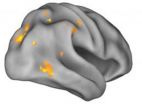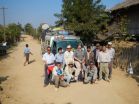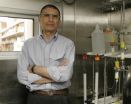(Press-News.org) Berkeley — The human brain is capable of a neural workaround that compensates for the buildup of beta-amyloid, a destructive protein associated with Alzheimer's disease, according to a new study led by researchers at the University of California, Berkeley.
The findings, to be published Sunday, Sept. 14, in the journal Nature Neuroscience, could help explain how some older adults with beta-amyloid deposits in their brain retain normal cognitive function while others develop dementia.
"This study provides evidence that there is plasticity or compensation ability in the aging brain that appears to be beneficial, even in the face of beta-amyloid accumulation," said study principal investigator Dr. William Jagust, a professor with joint appointments at UC Berkeley's Helen Wills Neuroscience Institute, the School of Public Health and Lawrence Berkeley National Laboratory.
Previous studies have shown a link between increased brain activity and beta-amyloid deposits, but it was unclear whether the activity was tied to better mental performance.
The study included 22 healthy young adults and 49 older adults who had no signs of mental decline. Brain scans showed that 16 of the older subjects had beta-amyloid deposits, while the remaining 55 adults did not.
The researchers used functional magnetic resonance imaging (fMRI) to track the brain activity of subjects in the process of memorizing pictures of various scenes. Afterwards, the researchers tested the subjects' "gist memory" by asking them to confirm whether a written description of a scene – such as a boy doing a handstand – corresponded to a picture previously viewed. Subjects were then asked to confirm whether specific written details of a scene – such as the color of the boy's shirt – were true.
"Generally, the groups performed equally well in the tasks, but it turned out that for people with beta-amyloid deposits in the brain, the more detailed and complex their memory, the more brain activity there was," said Jagust. "It seems that their brain has found a way to compensate for the presence of the proteins associated with Alzheimer's."
What remains unclear, said Jagust, is why some people with beta-amyloid deposits are better at using different parts of their brain than others. Previous studies suggest that people who engage in mentally stimulating activities throughout their lives have lower levels of beta-amyloid.
"I think it's very possible that people who spend a lifetime involved in cognitively stimulating activity have brains that are better able to adapt to potential damage," said Jagust.
INFORMATION:
Co-lead authors of the study are Jeremy Elman and Hwamee Oh, both of whom were postdoctoral researchers in Jagust's lab.
The National Institute on Aging and the McKnight Foundation helped support this research.
Researchers find neural compensation in people with Alzheimer's-related protein
Findings could help explain how some people stave off dementia
2014-09-15
ELSE PRESS RELEASES FROM THIS DATE:
Asian monsoon much older than previously thought
2014-09-15
The Asian monsoon already existed 40 million years ago during a period of high atmospheric carbon dioxide and warmer temperatures, reports an international research team led by a University of Arizona geoscientist.
Scientists thought the climate pattern known as the Asian monsoon began 22-25 million years ago as a result of the uplift of the Tibetan Plateau and the Himalaya Mountains.
"It is surprising," said lead author Alexis Licht, now a research associate in the UA department of geosciences. "People thought the monsoon started much later."
The monsoon, the largest ...
University of Leeds press release: One care lapse can be fatal for heart attack patients
2014-09-15
University of Leeds research has revealed that heart attack patients have a 46% increased chance of death within a month of discharge if they miss any one of nine types of care.
There is also a 74% increased chance of dying within one year if any one component of care is missed.
The nine pathways of care that have been identified are pre-hospital electrocardiogram, acute use of aspirin, restoring blood flow to the heart (known as reperfusion), prescription at hospital discharge of aspirin, timely use of four types of drug for heart attack (ACE-inhibitors, beta-blockers, ...
New insights in survival strategies of bacteria
2014-09-15
Bacteria are particularly ingenious when it comes to survival strategies. They often create a biofilm to protect themselves from a hostile environment, for example during treatment with antibiotics. A biofilm is a bacterial community that is surrounded by a protective slime capsule consisting of sugar chains and "curli". Scientists at VIB and Vrije Universiteit Brussel have for the first time created a detailed three-dimensional image of the pores through which the curli building blocks cross the bacterial cell wall, a crucial step in the formation of the protective slime ...
How an ancient vertebrate uses familiar tools to build a strange-looking head
2014-09-15
Kansas City, Mo. - If you never understood what "ontogeny recapitulates phylogeny" meant in high school, don't worry: biologists no longer think that an animal's "ontogeny", that is, its embryonic development, replays its entire evolutionary history. Instead, the new way to figure out how animals evolved is to compare regulatory networks that control gene expression patterns, particularly embryonic ones, across species. An elegant study published in the September 14, 2014 advance online issue of Nature from the Stowers Institute for Medical Research shows just how humbling ...
Breast screening for over 70s doesn't prompt sharp fall in advanced disease
2014-09-15
Instead, it may just lead to overdiagnosis and overtreatment, suggest the researchers, led by a team based at Leiden University Medical Centre in the Netherlands.
Their paper publishes as the Preventing Overdiagnosis conference opens next week (Monday 15 Sept), where experts from around the world will discuss how to tackle the threat to health and the waste of money caused by unnecessary care. The conference is hosted by the Centre for Evidence-Based Medicine at the University of Oxford in partnership with The BMJ's Too Much Medicine campaign.
The upper age limit for ...
Experts raise concern over unnecessary treatment of mild hypertension in low risk people
2014-09-15
Dr Stephen Martin and colleagues argue that this strategy is failing patients and wasting healthcare resources. They call for a re-examination of the threshold and urge clinicians to be cautious about treating low risk patients with blood pressure lowering drugs.
Their paper publishes as the Preventing Overdiagnosis conference opens next week (Monday 15 Sept), where experts from around the world will discuss how to tackle the threat to health and the waste of money caused by unnecessary care. The conference is hosted by the Centre for Evidence-Based Medicine at the University ...
Genetic testing can identify men at 6-fold increased risk of prostate cancer
2014-09-15
Scientists can now explain a third of the inherited risk of prostate cancer, after a major international study identified 23 new genetic variants associated with increased risk of the disease.
The study brings the total number of common genetic variants linked to prostate cancer to 100, and testing for them can identify 1% of men with a risk of the disease almost six times as high as the population average.
Scientists at The Institute of Cancer Research, London, and in Cambridge, UK, and California led a huge search for new genetic variants including almost 90,000 men ...
Rules of thumb for climate change turned upside down
2014-09-15
Based on models and observations, climate scientists have devised a simplified formula to describe one of the consequences of climate change: regions already marked by droughts will continue to dry out in the future climate. Regions that already have a moist climate will experience additional rainfall. In short: dry gets drier; wet gets wetter (DDWW).
However, this formula is less universally valid than previously assumed. This was demonstrated by a team of ETH climate researchers led by Peter Greve, lead author of a study recently published in Nature Geoscience. Traditional ...
Measuring modified protein structures
2014-09-15
Cells regulate protein functions in a wide variety of ways, including by modifying the protein structure. In an instant, a protein can take on another form and perform no or even the "wrong" function: in humans, proteins that fold wrongly can cause serious diseases such as Alzheimer's, Parkinson's or cystic fibrosis. Some of these proteins also have a tendency to "infect" other molecules of the same type and congregate into insoluble so-called amyloid fibrils or plaques. These amyloids can damage cells and tissues and make people ill.
Method breaks the shackles
Until ...
UNC researchers find final pieces to the circadian clock puzzle
2014-09-15
CHAPEL HILL, NC – Researchers at the UNC School of Medicine have discovered how two genes – Period and Cryptochrome – keep the circadian clocks in all human cells in time and in proper rhythm with the 24-hour day, as well as the seasons. The finding, published today in the journal Genes and Development, has implications for the development of drugs for various diseases such as cancers and diabetes, as well as conditions such as metabolic syndrome, insomnia, seasonal affective disorder, obesity, and even jetlag.
"Discovering how these circadian clock genes interact has ...
LAST 30 PRESS RELEASES:
Scientists discover why we know when to stop scratching an itch
A hidden reason inner ear cells die – and what it means for preventing hearing loss
Researchers discover how tuberculosis bacteria use a “stealth” mechanism to evade the immune system
New microscopy technique lets scientists see cells in unprecedented detail and color
Sometimes less is more: Scientists rethink how to pack medicine into tiny delivery capsules
Scientists build low-cost microscope to study living cells in zero gravity
The Biophysical Journal names Denis V. Titov the 2025 Paper of the Year-Early Career Investigator awardee
Scientists show how your body senses cold—and why menthol feels cool
Scientists deliver new molecule for getting DNA into cells
Study reveals insights about brain regions linked to OCD, informing potential treatments
Does ocean saltiness influence El Niño?
2026 Young Investigators: ONR celebrates new talent tackling warfighter challenges
Genetics help explain who gets the ‘telltale tingle’ from music, art and literature
Many Americans misunderstand medical aid in dying laws
Researchers publish landmark infectious disease study in ‘Science’
New NSF award supports innovative role-playing game approach to strengthening research security in academia
Kumar named to ACMA Emerging Leaders Program for 2026
AI language models could transform aquatic environmental risk assessment
New isotope tools reveal hidden pathways reshaping the global nitrogen cycle
Study reveals how antibiotic structure controls removal from water using biochar
Why chronic pain lasts longer in women: Immune cells offer clues
Toxic exposure creates epigenetic disease risk over 20 generations
More time spent on social media linked to steroid use intentions among boys and men
New study suggests a “kick it while it’s down” approach to cancer treatment could improve cure rates
Milken Institute, Ann Theodore Foundation launch new grant to support clinical trial for potential sarcoidosis treatment
New strategies boost effectiveness of CAR-NK therapy against cancer
Study: Adolescent cannabis use linked to doubling risk of psychotic and bipolar disorders
Invisible harms: drug-related deaths spike after hurricanes and tropical storms
Adolescent cannabis use and risk of psychotic, bipolar, depressive, and anxiety disorders
Anxiety, depression, and care barriers in adults with intellectual and developmental disabilities
[Press-News.org] Researchers find neural compensation in people with Alzheimer's-related proteinFindings could help explain how some people stave off dementia




